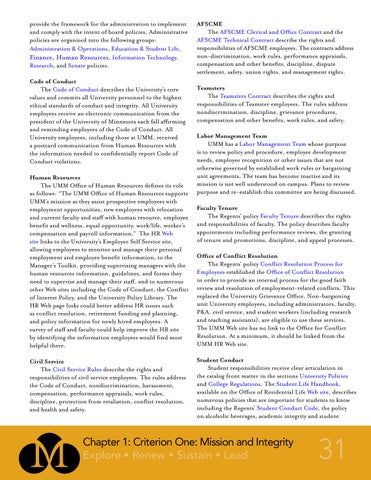provide the framework for the administration to implement and comply with the intent of board policies. Administrative policies are organized into the following groups: Administration & Operations, Education & Student Life, Finance, Human Resources, Information Technology, Research, and Senate policies. Code of Conduct The Code of Conduct describes the University’s core values and commits all University personnel to the highest ethical standards of conduct and integrity. All University employees receive an electronic communication from the president of the University of Minnesota each fall affirming and reminding employees of the Code of Conduct. All University employees, including those at UMM, received a postcard communication from Human Resources with the information needed to confidentially report Code of Conduct violations. Human Resources The UMM Office of Human Resources defines its role as follows: “The UMM Office of Human Resources supports UMM’s mission as they assist prospective employees with employment opportunities, new employees with relocation and current faculty and staff with human resource, employee benefit and wellness, equal opportunity, work/life, worker’s compensation and payroll information.” The HR Web site links to the University’s Employee Self Service site, allowing employees to monitor and manage their personal employment and employee benefit information, to the Manager’s Toolkit, providing supervising managers with the human resources information, guidelines, and forms they need to supervise and manage their staff, and to numerous other Web sites including the Code of Conduct, the Conflict of Interest Policy, and the University Policy Library. The HR Web page links could better address HR issues such as conflict resolution, retirement funding and planning, and policy information for newly hired employees. A survey of staff and faculty could help improve the HR site by identifying the information employees would find most helpful there. Civil Service The Civil Service Rules describe the rights and responsibilities of civil service employees. The rules address the Code of Conduct, nondiscrimination, harassment, compensation, performance appraisals, work rules, discipline, protection from retaliation, conflict resolution, and health and safety.
AFSCME The AFSCME Clerical and Office Contract and the AFSCME Technical Contract describe the rights and responsibilities of AFSCME employees. The contracts address non-discrimination, work rules, performance appraisals, compensation and other benefits, discipline, dispute settlement, safety, union rights, and management rights. Teamsters The Teamsters Contract describes the rights and responsibilities of Teamster employees. The rules address nondiscrimination, discipline, grievance procedures, compensation and other benefits, work rules, and safety. Labor Management Team UMM has a Labor Management Team whose purpose is to review policy and procedure, employee development needs, employee recognition or other issues that are not otherwise governed by established work rules or bargaining unit agreements. The team has become inactive and its mission is not well understood on campus. Plans to review purpose and re-establish this committee are being discussed. Faculty Tenure The Regents’ policy Faculty Tenure describes the rights and responsibilities of faculty. The policy describes faculty appointments including performance reviews, the granting of tenure and promotions, discipline, and appeal processes. Office of Conflict Resolution The Regents’ policy Conflict Resolution Process for Employees established the Office of Conflict Resolution in order to provide an internal process for the good faith review and resolution of employment-related conflicts. This replaced the University Grievance Office. Non-bargaining unit University employees, including administrators, faculty, P&A, civil service, and student workers (including research and teaching assistants), are eligible to use these services. The UMM Web site has no link to the Office for Conflict Resolution. At a minimum, it should be linked from the UMM HR Web site. Student Conduct Student responsibilities receive clear articulation in the catalog front matter in the sections University Policies and College Regulations. The Student Life Handbook, available on the Office of Residential Life Web site, describes numerous policies that are important for students to know including the Regents’ Student Conduct Code, the policy on alcoholic beverages, academic integrity and student
Chapter Introduction 1: Criterionand One:Response Mission and to Prior Integrity Review Explore Explore • Renew • Renew • Sustain • Sustain • Lead• Lead
31
